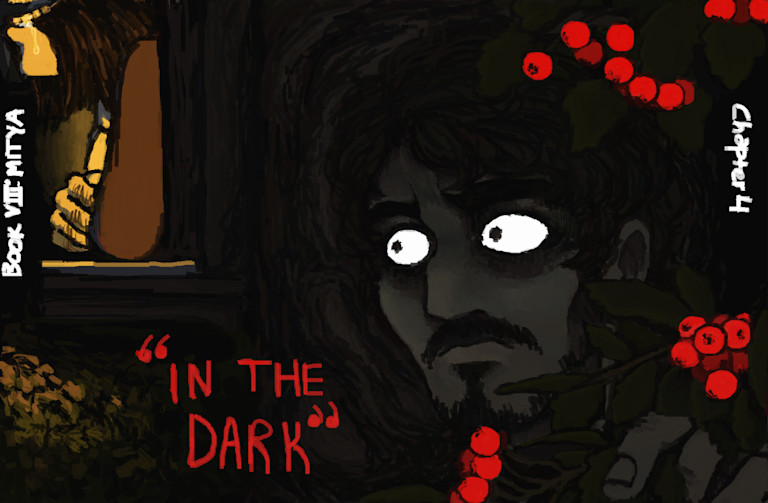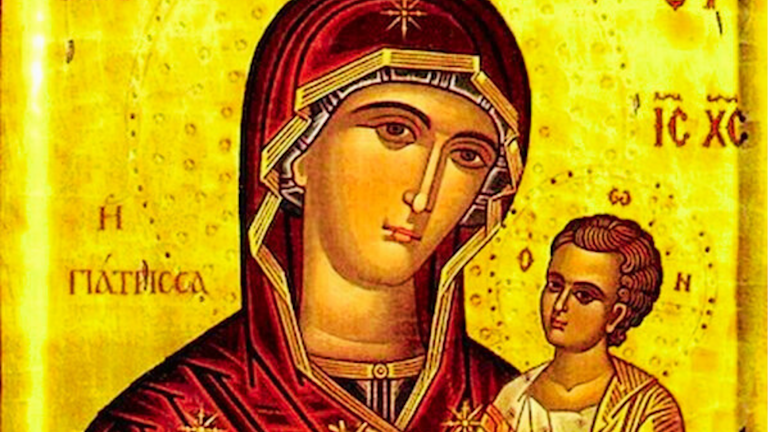May 31, 2024
In The Brothers Karamazov, Dostoevsky powerfully conveys our human nature as a search for wholeness apart from God, left chaotically incomplete as it seeks to satisfy itself in all the wrong places. It is a confession of erotic passion.
The erotic is a metaphysical phenomenon, as well as physical. In Plato's Symposium, it is a mediator, drawing the body to a higher transcendence. The erotic is a "'great spirit, Socrates; for the spiritual is between divine and mortal.' 'What power has it?' Said I. 'To interpret and to ferry across to the gods things given by men'" (Symposium, 106). It is a fundamental spiritual desire that draws us upward to what we perceive as beautiful. It is not just, however, a physical or aesthetic beauty, but also a moral and spiritual one.
And, according to Dostoevsky, this beauty is a riddle. As Dmitri confesses in The Brothers Karamazov: "Beauty is an awful and terrible thing! Terrible because it is undefinable, since God has given us nothing but riddles" (108).
Consider pornography. Does it not consist of beautiful bodies on screen for the purpose of erotic pleasure? What harm is it, if all participants are in acting in free consent? Or perhaps, what is more beautiful is the long standing expression of fidelity, a covenantal faithfulness to one person for a lifetime? These two desires of two views of beauty war within us. We might be persuaded that one form of beauty is deeper and better, but the other seems too so alluring.
The war wages within. This is one reflection of the conundrum of the erotic.
Confessions of a Passionate Heart
In The Brothers Karamazov, The oldest brother, Mitya, confesses to his younger brother, Alyosha, the conflict of desire that exists in his soul. Mitya is an erotic man, drawn to the beautiful, but also competitive and violent. He is willing to fight for what he wants. He is willing to shame and humiliate others in order to elevate his own status and honour, "I'm a Karamazov. Because when I fall into the abyss, I go straight into it, head down and heels up, and I'm even pleased that I'm falling in such a humiliating position, and for me I find it beautiful" (The Brothers Karamazov, 107).
He describes to Alyosha the struggle within him as that between the beauty of Madonna and that of Sodom. On the one hand, he longs for the purity of the Madonna, a Russian orthodox image of chastity and humble love, but is continually drawn to the twisted erotic beauty of Sodom, "Beauty! Besides, I can't bear it that some man, even with a lofty heart and the highest mind, should start from the ideal of Madonna and end with the ideal of Sodom. It's even more fearful when someone who already has the ideal of Sodom in his soul does not deny the idea of Madonna either, and his heart burns with it, verily, verily burns, as in his young, blameless years" (The Brothers Karamazov, 108).
Sodom is an allusion to the story in Genesis, when the men of the town wish to have sexual relations with Lot's angelic guests. It is a story of unbridled erotic chaos, far from the seeming serenity of the garden of Eden, now barely a memory. Lot offers his daughters instead, who will later, after the city’s destruction, seduce him in his drunkenness so that he might impregnate them. Of course, there are deep ancient middle eastern cultural components at work in this story, but desire is complex, incredibly powerful, and can deceive us.
Mitya’s story, too, is a tragic one. He lives in a sexual rivalry with his own father for the same woman, Grushenka. He knows he acted shamefully in his treatment of his fiancé, Katya. But he cannot shake his erotic passion for this Russian beauty; neither can his father. This rivalry leads him to such madness that he considers murdering his own Father.
At the centre of the story is Mitya, in the dark with a knife, ready to enact his vengeance. Passionate desire leads to social and familial violence, "the personal loathing was increasingly unbearable. Mitya was beside himself, and suddenly he snatched the brass pestle from his pocket . . . " (The Brothers Karamazov, 393). He does not follow through. Nonetheless, despite the desire to commit patricide, Mitya is falsely accused and the second half of the novel deals with his imprisonment, his suffering and his trial. He confesses that he wanted to kill his father, but protests he did not actually do it.

A Taunting Masculinity
As we see in Mitya, the erotic passion for beauty can also transform into a toxic form of masculinity that seeks to dominate, like a bull that wants to mate and seeks to quell the competition. It is what Nietzsche describes as the insatiable dionysian will to power, the god of chaos at the root of life.
I remember being at an outdoor party one evening. It was very late. There were a few of us sitting around a fire. One man there was older and much larger than me. He was not only obviously wasted and high, but also very bored. He lived in a different town and he and his friends had a reputation for violence. In fact, they would seek violent confrontation just for the joy and thrill of it. Violence became for them a form of transcendent beauty!
He kicked the fire and sparks flew everywhere, causing us to stand up in alarm. A piece of wood landed on my hand and burned me. I yelled at him in protest and it was precisely the reaction he was looking for. In a moment, he was directly in my face, taunting me. He was clearly looking for a fight.
In this situation, it was like Thomas Hobbes' description, where he says that, left to their own devices, “every man would war against every man” (Leviathan, 185) And in this “natural” mode of survival of the fittest, it is the strongest who come out on top.
I was not so stupid, nor so drunk, that I did not realise that if I fought back I would become quite injured. I backed off and went home. Although it wounded my skewed sense of masculine ego, it was probably the smart thing to do, to get out of there. I never saw this man again in my life.
However, is this not what we see at play in the world? What is terrifying is when these erotic passions for power and dominance are translated into larger systematic scales, such as in imperial fantasies. As Dostoevsky and Nietzsche demonstrate in their work, often what is perceived as a semblance of order is really only a mask of violent chaos.
What "beautiful" dreams and political fantasies have captivated the heart of man, for instance, from Rome, to the British empire, to Russia's current attempt to retake Ukraine?
Descent into Darkness
The erotic without covenant love is the path to a living hell. In this prophetic novel, Dostoevsky points to the reality of hell and chaos within each one of us. What is “hell”? asks Zosima. It is “the suffering of being no longer able to love” (The Brothers Karamazov, 322). One is so consumed with one's own egotistical desire, for an inordinate passion for beauty abstracted from God that we lose the ability to have concern or love for the Other.
Hell is a spiritual state of a proud self turning inward, the seed refusing to die to itself, refusing to open up to the loving truth of God's beauty. It is our God given desire for the transcendent, the beauty of God himself, but turned inward, gnarled and twisted, moving against itself.
In the Brothers Karamazov, while Mitya struggled with this experience of hell, he was not totally consumed by it. He wrestled with it, for the love of the "Madonna," the humble love of Christ, was still with him. It was a spiritual war within him. His confessions are said to his beloved brother, Alyosha, who represents this humble love of Christ. This taps into Dostoevsky's engagement with his Russian Orthodox tradition, creating literary art that is iconic, helping us to perceive the beauty of Christ.

For Dostoevsky, what is truly beautiful is revealed in the Gospel of Christ, the self-giving love of God, given to the world through his suffering and death. In contrast to violence and the will to dominate, Father Zosima teaches, "One may stand perplexed before some thought, especially seeing men's sin, asking oneself: 'Shall I take it by force, or by humble love?' Always resolve to take it by humble love. If you so resolve once and for all, you will be able to overcome the whole world. A loving humility is a terrible power, the most powerful of all, nothing compares with it" (The Brothers Karamazov, 319).
What is most beautiful (and powerful) is the precious image of the humble love of Christ, an image sown into the heart of every soul. However, our sense of moral beauty must be also crucified with Christ, that it may rise up to its true fulfilment. It is this reconciled image in us that will transform our broken and violent world.
Read Part 5: A Precarious Solitude
Go to the series: A Transfiguration in Time
Sources
Dostoevsky, Fyodor. The Brothers Karamazov. Translated by Richard Paver and Larissa Volokhonksy. New York: Vintage, 1990.
Hobbes, Thomas. Leviathan. London: Penguin, 1985.
Plato. The Symposium. Translated by W. H. D. Rouse in the Great Dialogues of Plato. New York: Signet Classics, 2008.
Suderman, Alex D. The Sacrament of Desire: The Poetics of Fyodor Dostoevsky and Friedrich Nietzsche in Critical Dialogue with Henri de Lubac. Eugene, OR: Pickwick Publications, 2022.

